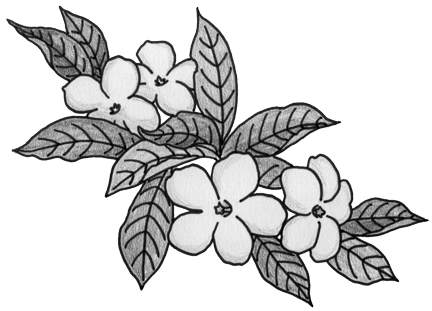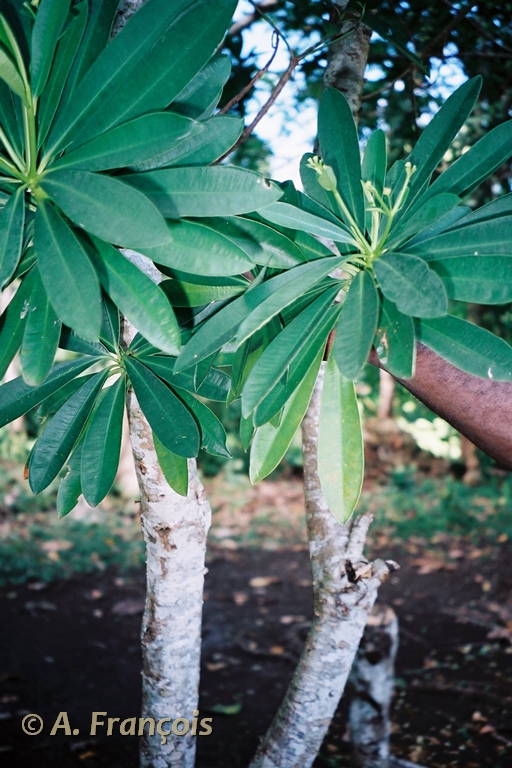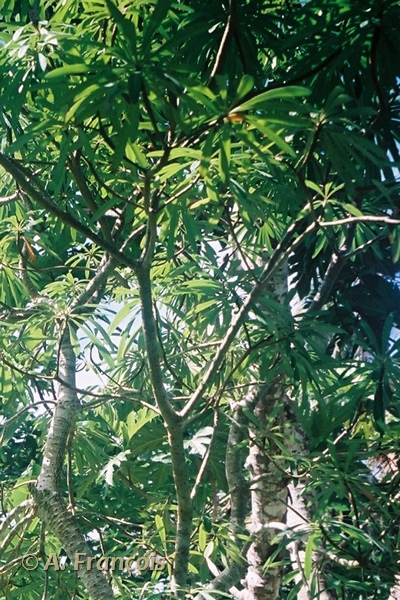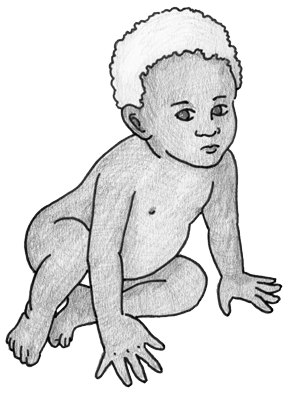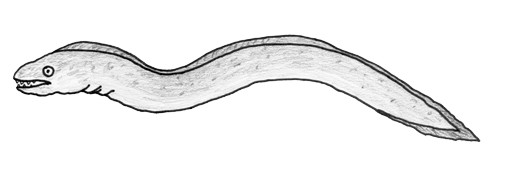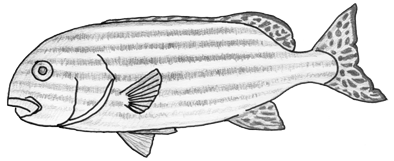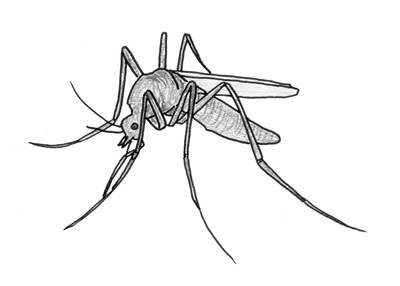POc*lima
Anatomy
arm; hand
| Li-vet' piene ñe ma dapa.They talk with their hands. |
| Webwe i-vene i-wen' ne ma dapa; loko i-vio ne ma dapa; vilitoe i-vio ne viabasa dapa.dancersThey had armbands on their arms, scented leaves on their armbands; and white flowers in their hair. |
| Ai’ akapa i-tabe ma ini boso eo ka uña damiliko iono.blessingLet our Father raise his hand above you and your children. |
1sgma ene3sgma ini
POc*Rumaq
Cf. moe ‘house’
Bpossessive classifier
| moe ma tadoe Devils' lair (ancestral temple) |
| Li-pinoe li-dai ra ra awoiu, li-tabo li-le ne bonge ma dapa.dancing SpiritsThey dance on and on, until they return to their cave home. |
| Toplau mwa gete clubhouse for youngsters |
| Voko ma Gete Youngsters' Rock |
seemam
Bsecond verb, intransitive
POc*matakut
be afraid, be scared (of, ñe)
| Dapa li-madau ñe toñaki ponu.They were afraid of that ship. |
maga maᵑga noun, relational
liquidsmall quantity, drops
| maga eroa bit of water |
| maga kerosina small quantity of kerozene |
1 – animal, humgrow up, get older
| Noma, po apali i-maili i-ven' i-ka, i-te tev' ai' iape me et' iape.In the old days, when a child grew up, he would stay with his parents. |
2 – plant+grow big
| Ngogoro ka i-maili.The bush has grown there. |
| Pi-romo uie i-maili pine.You can see how the leaves have grown big. |
| Avtebe adapa ka i-maili i-vene kata ka vitoko kape moso.Their taros had grown up and were almost ripe. |
synonympine
Polynesian*mako
gendance, incl. modern dance
| Li-vo aero i-dai, me kape le-mako ne to.They erected a fence around (the village area), for us to dance in the middle. |
| Li-si teveliko ne kulumoe, me le-kila idi le-ka le-mako.Someone in the village is blowing the conch, calling out to people to come and dance. |
| Ba-mako ra i-vagasi vono i-sodo.discoYou danced together until dawn! |
~makui (i·)makui verb, intransitive
makumoso makumoso noun
Cf. moso ①▻② ‘ripe, old’
Malangune malaŋune noun
Mythology
Malangune creatures: k.o. goblins or pixies
| dameliko Malangunethe Malangune pixies |
~maliawo (i·)maliawo verb, intransitive
make a fire
| Ka i-mamei ponu ka i-maliawo ka i-wene teve.As she was feeling cold, she lit a fire and lied down beside it. |
see lexical list atiawo
maluo1 noun
POc*maqurip
POc*maqurip
s.th., s.o.live, be alive
| Nga ero tae, kape i-maluo metae.Without water, it won't be able to survive. |
| dapa pe li-maluo[those who are alive] the Living |
| Mamote i-maluo, we tae? – Tae, ka i-bu.Is she still alive? – No, she's already passed away. |
1 – s.o.voice
| Mama ini pine.He has a loud voice. |
| Ni-lengi mama Stanley ni-sai ñe mama Alex.I heard Stanley's voice, I thought it was Alex. |
| I-atevo iepiene ni-la mama ini.I recorded his voice as he told the story. |
4 – espmanmarriage proposal sent to the family of a woman
| U-teli mama ene se.formula for official engagementPlease send her ‘my voice’. |
main entry~teli mama
mama2 mama noun
k.o. traditional pudding, made of taros (jebute) and Canarium almonds (vongoro), and served in important social occasions
| Li-wete jebute li-wete vongoro awoiu pon, li-ejau mama.We mash taros, we crush almonds, and make the pudding. |
📘 One cooks taros first, and then mash them, together with almonds, in a mortar (monone), until it becomes a tender dough.
~mamabe (i·)mamaᵐbe verb, intransitive
be divided, split in (two, three…)
| Toñaki ponu, i-mamabe tilu.The ship split in two. |
| Iaero ne i-mamabe tete.The river splits in three. |
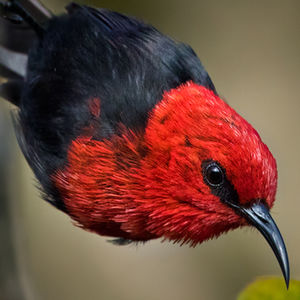
| Mamdeuko po via moloe.The honeyeater has red feathers. |
AnthropologyVanikoro people used to trade the red feathers of this little bird with other islands of the Santa Cruz archipelago, who then transformed into customary money.
viavia mamdeuko noun
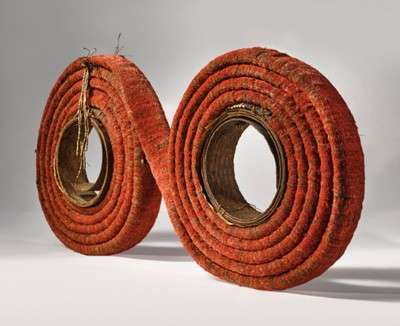
feathers of Honeyeaterfeather money: an artifact used by neighbouring Santa Cruz islanders as their traditional money. Takes the form of a red belt, made with the red feathers of the Honeyeater bird.
Feather money in Santa Cruz ✧ Viavia mamdeuko
Dapa Niteni li-ejau viko iadapa ñe viavia menuko pe moloe, enga ini ‘mamdeuko’. Viavia pon, li-la abwa bale li-lateli ne mengela vilo. Viko peini, dapa li-kila li-ko ‘noviapu’.
“The people of Santa Cruz (Niteni) make their money using the feathers of a red bird called ‘mamdeuko’, Cardinal honeyeater. They use breadfruit sap to glue those feathers to a piece of wood. That traditional form of money, they call it ‘noviapu’.”
~mamei (i·)mamei verb, intransitive
Aparticle
Grammar
before the predicatestill
| Pon mamote i-te.He is still alive. |
| Mamote ni-mui.negative verb (~mui)I still don't know / I don't know yet. |
| Ini mamote emele mwatebe.noun predicateShe was still a young woman. |
| Temaka mamote nedemo we ka tomoro?Is it still dark? or daylight already? |
| Basavono ponu, mamote kulumoe Tetawo mate idi abia li-te ene.At that time, the village of Tetawo was still inhabited. |
mamote… tae
mate… tae
construction
Grammar
still… notnot yet
| Ka li-nabe keba ia mamote ba-kila keba tae.We're engaged, but we aren't married yet. |
| Mate pi-toe dero i-abu awoiu tae.We haven't cut down all the cauri trees yet. |
| Ka basavono ponu, mamote damala tae.existential taeIn those times, there were no Westerners yet (in this area). |
| Mamote menu one tae.possessionI don't have children yet. |
manoko manoko noun
mañoka maɲoka
manioka
noun
EngmaniocaPortuguesemandioca
| velebie peini maniokacassava starch |
📘 Plant introduced recently.
marama marama noun
Motamaramaworld
world
| Dapa abia ne marama na awa dapa i-viane le-te wako.Everybody in this world just wants to live in peace. |
synonymlovia vono
synonymkulumoe▻⑤
POc*mata
1 – man, animaleyes
| Mata ene tevie i-meli.[lit. My eyes on one side hurt] One of my eyes is painful. |
| Ene ni-mede kaipa tae, ene ni-romo ñe mata ene!I'm not lying to you, I saw it with my own eyes! |
| Mata ene i-mokoiu.[my eyes are asleep] I'm feeling sleepy. |
| Mata ini kilo.She's blind. |
2 – foll. by motion or directional verbgaze, direction of the eyes as they look
| Mata da i-koie ne moe ponu la-romo.[their eyes went into the house] They looked into the house and then saw it. |
| Mata i-katau tetawene na!Observe carefully [lit. let your eyes follow] these drawings! |
9 – plantsprout, seedling, shoot, offshoot
| mata balesprout of breadfruit tree |
| mata luro germinated coconut |
| La-tabe mata ka la-lui la-do i-katau ngogoro.kaori treeThey collected shoots, and began to plant them around the island. |
| mata buletaro shoot |
~mata2 (i·)mata verb, transitive
rock ‹baby›
| Keba ba-bwatui ba-ko ba-mata ini, ia metae.We tried to rock him (asleep), but no way! |
mataiko mataiko noun
Cf. (?) mata ①▻⑤ ‘opening’
Naut
navigable passage: strait, channel
| Vilisao i-botongo se mataiko ponu.The tornado was blocking the passage. |
| Li-ka ne mataiko Paiu ponu, dapa li-te takoie ponu, ne kulumoe pon.As they were [sailing] through the Paiou channel, some men were waiting for them on the coast, on land. |
synonymbenoe
Cf. mata ①▻⑨
matapiene matapiene noun
way of life; behaviour
| Mata piene pon, i-wene moli teve dapa.That way of life was easy to them. |
| Li-waivo idi wopine kula pe li-sube ñe matapiene kula.initiates’ clubhouseThey teach those initiates who may have erred in their behaviour. |
Architecture
doorway: entrance of a house, where the door (ruene) stands; somet. door
| Ni-woi tanoma ene ne matarone.I banged my forehead on the door. |
mavanga mavaŋa noun, relational
the middle of ‹several people›, amongst
| Lupo i-vio ne mavanga idi.Lupo was standing in the middle of the crowd. |
me1 me coordinator
and
| uña momoso me damelikowomen and children |
| ai’ iape me ete iape.her parents [her father and her mother] |
| añaña longe me labarosmall firewood and coconut coir |
| visone me puro ka malebua bow with darts and stunning arrows |
| Li-kanu buioe me puluko.They would chew areca nuts with betel leaves. |
synonymka ①
Asubordinator
Grammar
1 – purposivePurpose subordinator: in order to, so that
| Dapa li-woi nuduro ne touro, me i-botongo temaka.They put up taboo signs on the seashore, to protect the area (from poachers). |
2 – with adjective predicatesforms the causative
| Li-tabe i-le i-wene ne aeve me kokoro.They bring it out to lie in the sun so it dries up. |
| Kava li-totoe, li-wete me wamtaka.You dice up the kava, you grind it into small bits [lit. grind it so it's small]. |
derivativeme kape
~mede (i·)meⁿde verb, transitive
2 – espmislead, deceive, lie to ‹s.o.›
| U-mede kupa etapu!Don't deceive us! |
| Ñara kape ne-med’ eo!I wouldn't want to mislead you (by making a mistake). |
| Ene ni-mede kaipa tae, ene ni-romo ñe mata ene!I'm not lying to you, I saw it with my own eyes! |
me kape me kape subordinator
Grammar
1 – purposivePurpose subordinator: in order to, so that
| Li-vo aero i-dai, me kape le-mako ne to.They erected a fence around (the village area), for us to dance in the middle. |
| Li-te ne pwama iaero re ka li-ko me kape li-apilo toñaki.They stayed by the river, with the plan to build a ship. |
synonym~ko me kape
melevele melevele noun
1 – climatic disaster leading to famine; hence famine, massive and unexpected food shortage in a population
| Tepoe, pi-ejau peini melevele.We prepare 'tepoe' biscuits in case of a disaster. |
| Velebie peini otovo, peini melevele pine.Sago starch is good in case of a major famine. |
| Komoudo, va li-vai kokoro me peini melevele.Clam shells are commonly dried in the fire, and preserved in case of a famine. |
Flora
2 – metona shrub (Verbenaceae) whose food was traditionally consumed in case of famineVitex trifolia.body parthurt, be painful
| Basa ene i-meli.My head aches. |
| Die ini i-meli.[Her back hurts.] She's having labour contractions. |
| Nara sa i-meli!Make sure you don't get tummy ache (i.e. don't end up heartbroken!) |
melia melia noun
Cf. ~meli ‘hurt, be painful’
pain
| Nganae kape li-lengi melia dapa ñe tae.ParadiseNothing can cause them any pain. |
memia2 memia adjective
Sbj = ije ‘teeth’feel a bitter taste
| Ije ene memia.I feel a bitter taste. |
| Dapa pe li-anu kava, li-e vebe ñe ponu, me kape ije dapa memia etapu.Kava drinkers eat cutnut right after it, to take away the bitter taste. [lit. for fear their teeth might taste-bitter] |
1 – dislike, not want s.th.
| Ero pana na ni-mene.I don't want that tea. |
| Awa eo i-viane? – Tae, ni-mene!Do you want it? – No, I don't. |
mengela meŋela noun, relational
synonymwowo ①
Aparticle
Grammar
often combined with kape ‘irrealis, future’irrealis negation
2 – can't: be unable to
| Tepao 'naka i-makoe, kape ne-makui ñe metae.My fishing gun is broken, I can't use it for fishing. |
| Kape ne-vete susuko metae.I'd be unable to tell the exact story. |
Bpredicative
used absolutelyto no avail; no way
| Keba ba-bwatui ba-ko ba-mata ini, ia metae.We tried to rock him (asleep), but no way! |
| Dapa ne temotu tilu pon li-la kuo li-ko me le-wai i-koie tetakoie: metae!The people on the two islets took to their canoes, hoping to paddle towards the (main) island – to no avail. |
synonymtae ⓑ▻③
~metei (i·)metei
~mete
Averb, transitive
Bverb, reflexive
reflexive structureshy of oneselfbe shy, timid; shy away (from, ñe)
| U-met' eo ñe ene etapu!Don't shy away from me! |
| Emel' enone i-mete ini pe i-rom dokta.My wife is too shy to see the doctor. |
| Stanley i-met' ini tamwase pe i-mako, ra pi-tedie ini.Stanley was too shy to dance, so we encouraged him. |
< (?)°mataulaPOc*mataeye, spot*pulanmoon
2 – month
| noma metele[face of the month] end of the month |
| ne metele iote ka i-le awoiulast month |
| ne metele tilu-tae[in eighth month] in August |
| Li-apilo toñaki awoiu, bara i-vagas’ metele tuo nga ponu.The building of the ship must have taken about six months. |
| ~kovi metele [lit. miss months] be pregnant |
mevele mevele noun
front yard: private, open-air area in front of a house
| Ni-bo ajekele mina mevele 'none.I have collected rubbish from my front yard. |
synonymmata moe
1smevia ene3smevia ini
meviko takataka meviko.takataka noun
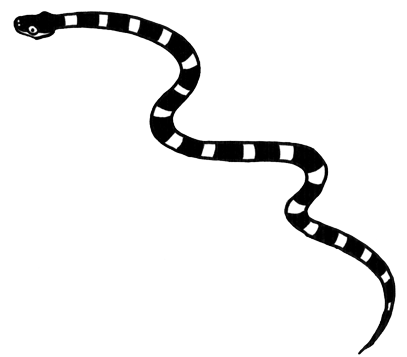
| Ni-le ne revo nanana ni-romo meviko takataka.I was at sea today, and saw a sea krait. |
synonymabilo peini revo
meviro mefiro noun
war, conflict
War in Vanikoro ✧ meviro
Noma, dapa Lovono li-ejau meviro li-kamai Tanema li-lui Teanu. Meviro awoiu, ka li-te ne basavono wako.
In the old days, the Lovono tribe used to wage war with Tanema, and with Teanu. When the wars ended, they finally lived in peace.
Averb, intransitive
Cf. ~kae ‘do how?’
miko miko noun
earthquake
| Nobwogo miko i-la i-wai moe ne.Last night an earthquake shook the houses here. |
see~wai ② ⓐ
(?) POc*[ma]Raqanlight in weight
1 – dry
| Uña namolo enone po ai-abu ka mimione? – Tae, mamote i-dobuo.My clothes that you washed, are they dry yet? – Not yet, they're still wet. |
antonym~dobuo
2 – light, of light weight
| Nga le-vilu ñe kuo, we le-vesu bavede ñi nga ponu, wako pe mimione.If people travel on their canoe, or sail on it, it's better for (the wood) to be light. |
antonymmotoro
3 – figof minor importance, futile; unimpressive, mediocre
| Dapa wopine na li-vete piene ne “ebele ini!” tamwase, pe li-ko motoro. Ia piene “wako” pon, mimione.The elders very often use this expression “it's wonderful”: they find it an elegant [lit. heavy] word. Whereas a word like “alright” is a bit too common. [it's light] |
antonymmotoro
Apreposition
Ablative preposition: from, out of
| Somu tamwase mina kupa.locative senseIt's too far away from us. |
| Ka i-te ra i-le i-madau ka i-kotu mina dapa i-le i-te ne gilita ponu.He got scared and ran away from them, all the way to the hill. |
| Le-wamu piene mina dapa.figurativeLet's keep our discussion secret from them. |
Badverb
from itanaphoric counterpart of the Ablative preposition: ‘from it’, ‘of it’; hence away, off
| Li-la uo li-ta bele mina.They're peeling off the skin of yams. |
| Li-loko aero we anive, li-si kangele i-ke mina.They collect cone shells, and cut off the mollusc part. |
| Nga u-katei namuko iote, u-toe dekele mina.If you catch a fish, you must chop off its tail. |
Bsecond verb, transitive
| Dapa li-la laviko, namolo, kangele teuko, li-la li-mini kupa.They would take pearls, clothes, fish hooks, and give them to us. |
2 – with other verbs(do V) for ‹s.o.›, for the benefit of ‹s.o.›. Equivalent of a Dative
| U-ko ruene u-mini ini.Open the door for her. |
| Kape le-wabe le-mini dapa po li-anu kava.They would serve (fruit) to those who were drinking kava. |
| Ni-la piene ono me ne-botongo ne-mini kaipa.I’m recording your language so I can take care of it for you. |
| Gi' one iote i-bo kuo i-mini dapa ne kulumoe.My uncle creates canoes for the villagers. |
| tanoe pe li-nabe li-mini dapathe territory that had been assigned to them |
| Li-le li-la ngatene li-mini dapa damala.BlackbirdingThey travelled to work for (the benefit of) White people. |
| Dapa iupa noma li-atevo piene peini Laperus li-mini kupa.Our elders told the story of Lapérouse to us. |
| Li-tomoli li-mini idi.malefactiveThey lie to people. |
minga miŋa
(?) POc*ŋaican
Blocative
one day, in the future
| Minga kape le-sune angede ovene po Laperus i-si ponu.One day someone will find the message that was written by Lapérouse. |
synonymmoro iote
mo1 mo particle
immediately; as soon as
| I-ka i-ka i-ka ponu, dapa kula mo ka li-wo.But as they came closer and closer, some of the villagers immediately ran away! |
| Da-tilu po la-vili kava le-wabe mo le-iumu le-lui teve Teliki Makumoso.Squeezing the kava, they filled up (the container) and immediately served it to the High Chief. |
| I-mui pe i-mo.disabled childHe cannot speak. |
| Ka i-mo tae!accident+He cannot speak any more. |
| U-tau uro, u-mo samame.incantationAs you burn the magic charcoal, you talk to it. |
synonym~vete piene
~mo korone verb, intransitive
talk strongspeak with a stern tone of voice, esp. in giving a lesson or firm advice; hence scold, argue (with s.o., se)
| Ni-mo korone se ni-ko me i-tabo i-ejau etapu.I firmly warned him not to do it again. |
| Na teliki ka i-mo korone se da.Now the village chief is scolding both of them. |
~mo pine verb, intransitive
talk bigspeak with a loud voice, e.g., when in anger
| Awa ini i-aka, i-mo pine.He was angry, talking loudly. |
moboe moᵐboe noun
hole, opening
| Noma li-madau pe moe moboe abia ene, li-ko na kape idi le-wete dapa ne visone me puro.Our ancestors used to avoid having too many openings in their houses, for fear of being shot with arrows. |
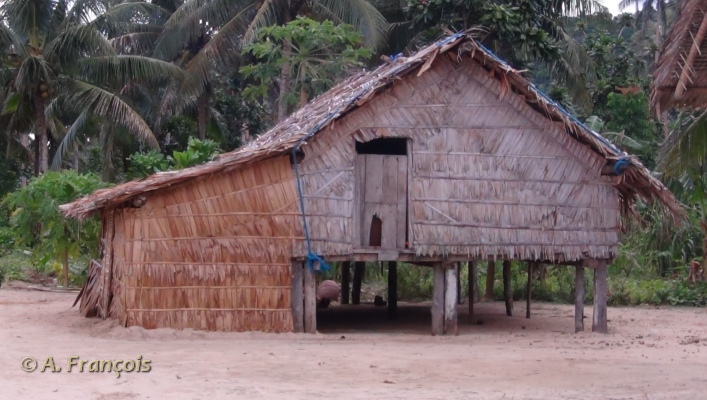
POc*Rumaq
1 – house: tradit. wooden construction with bamboo wallings and sago thatch
| li-vo mwoebuild a house |
| ebele moethe structure of the house |
| telemwoe peini mwoehouse wallings |
| ne lema moeinside the house |
| Pi-wete otovo pi-ko pe-songai moe.We are making the roofing to repair our house. |
| moe pe li-apinu ene[the house they cook in] cooking house, separate kitchen |
Parts of a house ✧ mwoe
| mata moe | frontyard |
| mataruene | doorway, entrance |
| ruene | door |
| telemoe | wall, walling |
| tokoli | raised-floor structure |
| tapaia buioe | floor |
| pwa tokoli | space under stilted house |
| ebele moe | structure of a house |
| nengele moe | components of a house* |
2 – genstructure or place analogous to a house, in its shape or its function
| Moe iaba pwo; iote iu, ie mwaliko iote.apartment in a storey houseOur flat is located below; as for the one above, it belongs to someone else. |
| Tepuke ponu, kuo pine; moe aplaka pon, ne pongo kuo pon.The ‘tepuke’ ship is a large canoe; it has a small cabin, on top of the ship. |
| moe etapu [holy house] church |
| moe ma tadoe the lair of Spirits |
| mwoe ie telupea pigeon’s nest |
moe ma tadoe moe ma taⁿdoe
mom tadoe
mam tadoe
noun
Anthropology
gods’ lairplace (typic. cave), whether covered or not, haunted by spirits or deities (tadoe); hence heathen temple
| Ka ponu li-la viko, li-lui li-lateli ne moe ma tadoe.They took the ritual money, and deposited it in the gods’ lair. |
moko moko
mwoko
noun
1 – coral; esp. large coral formation
| Basavono na toñaki ka moko.wreckToday the ship has turned into coral reef. |
| Tepungo pon voko wopine li-karau ne mwoko ka uña viko me komudo li-vio ene.Coral rocks are large boulders that grow on the reef bed, and that's where shells and clamshells grow. |
synonymviro ②
POc*maturuR
1 – sleep
| Kape ne-le ne-mokoiu. – Susuko!I'm going to sleep. – Alright! |
| Li-atevo iepiene pe noma, li-oburo, li-vongo ka li-mokoiu.We tell old stories, we sing, we eat and then we go to sleep. |
Aadjective
1 – empty
| Moe enone moli.My house is empty / is free. |
| Li-bu awoiu. Iune i-te tae. Kulumoe Pakare moli.mythEverybody died: nobody survived. The village of Pakare was emptied. |
synonymviñe
Bpostverb
2 – without expected effects: hence (do) in vain, for nothing; with no satisfying result
| Li-vo moe moli.They built a house in vain. (it's useless) |
| Ni-sava none moli.I bought food for nothing. (it was wasted) |
3 – hence(do/buy) for free, with nothing in exchange
| Program kula idi li-la moli.Some software programs are free [lit. people give them unconstrained]. |
| Ini i-langatene moli.He works for free. |
4 – eat, drink+without expected ingredients: hence minimally, simply, in a sober or pure fashion
| Ni-anu moli.waterI'm drinking it pure (=without adding sugar etc.). |
| Ni-vongo moli.I'm eating ‘minimally’ (=only vegetables, but no meat). |
5 – with no binding rules or ties: hence randomly, aimlessly, haphazardly
~le moli verb, intransitive
serialised after a verbgo aimlesslybe random; go with no specific rules; hence not matter, etc.
main entry~lemoli
1 – wander; stroll around
| Poi pe li-womanga ne kulumoe, vao i-moloe ne ngogoro.Domesticated pigs are fed in the village, but wild pigs wander about in the forest. |
| Laperusi vana i-moloe ne nom' ole take ne.Lapérouse used to stroll around along that sand beach over there. |
Redup. mobo ①
morning
| Momobo wako!Good morning! |
| Dapa li-aiu momobo li-vongo adapa.They woke up in the morning and took their breakfast. |
POc*matuqa
poss. classifierenaka
(?) POc*ma-raqandaylight
Moments in the day ✧ moro
| bogo ; bwogo | night; 24-hour day |
| moro ① ; tomoro | day, daylight |
| vono i-sodo | dawn |
| momobo | morning |
| tomoro wako | midday |
| aeve i-le ; ~le ② ⓐ▻⑤ | early afternoon |
| aeve i-tavali ; ~tavali | late afternoon |
| ~la ② ; vonila | dusk, evening |
| nedemo | be dark, be night |
| ne bwogo | at night |
| nobwogo | last night |
| mobo ① | tomorrow |
| pepane | yesterday |
day, from daybreak (vono i-sodo) to dusk (vonila)
| moro abia every day |
| Li-bo kuo votobo pe i-la moro tete we teva.Making a canoe can take up to three or four days. |
| moro pe li-ve eothe day when you were born |
| to moro → tomoromiddle of day → midday → day |
moro iote moro.iote locative
1 – a dayone day, in the past or future
| Ra ra, moro iote iawo i-bu.They were living like that, but one day, the fire died out. |
synonymmoro waini
moro waini moro waini locative
1 – a day onceone day, in the past or future
| Vana li-atevo eo ka li-ko bwara moro waini kape u-tabo u-vagasi dapa.They often talk about you, and they hope that one day you will visit them again. |
synonymmoro iote
moso1 moso adjective
POc*matuqa
~mote (i·)mote verb, intransitive
nut+ripe, ready to eat
| Ra ra i-le ne to ebieve, vongoro ka i-mote.Time went on, till they reached mid-season: this is when the almonds had finished ripening. |
see lexical list atmoso ①
POc*mataq
motomoro motomoro noun
1 – wound
| Taluaito i-vao motomoro.The doctor pressed on the wound. |
| Motomoro iono kape wako.Your wound will heal. |
poss. classifierenone
1 – heavy
| Pe li-anu kava, ebele idi motoro.When you drink kava, you feel your body is heavy. |
antonymmimione
2 – figimportant, major, significant
| Ne-ko ne-viñ' eo ñe piene motoro.I'd like to tell you about an important issue. |
3 – behaviourrespectful; considerate, esp. towards elders and institutions
| Awa ene motoro ñe piene pe a-viñ’ ene.[my mind is heavy…] I give a lot of consideration to your words. |
4 – speechformal, carefully worded; elegant, becoming; idiomatic
| Dapa wopine na li-vete piene ne “ebele ini!” tamwase, pe li-ko motoro. Ia piene “wako” pon, mimione.The elders very often use this expression “it's wonderful”: they find it an elegant [lit. heavy] word. Whereas a word like “alright” is a bit too common. [it's light] |
antonymmimione
motovo motofo noun
1 – wait! hang on!
| Mou, le-vongo ko!Wait, let's first have dinner! |
| Mou, u-tabo!Hang on! Repeat please? |
| Ia ni-mui, nga u-ium’ u-viñ' ene!I didn't know, you should have first told me! |
| Ene ni-mui ni-ko kape n-ajau nganae kape wako.I don't know what to do. |
| Ni-mui mijaka.[lit. I'm a bit ignorant] I'm not sure. |
antonym~ovei
| I-mui pe i-mo.He cannot speak. |
| Mamote i-mui pe i-tatale.He's still unable to walk. |
| Ni-mui pe ni-vete piene adapa.I don't know how to speak their language. |
Synt.The subordinate verb can be either Realis or Irrealis.
antonym~ovei
3 – dynamic readingforget, be unable to remember ‹s.th.›
| Dapa pie akapa ka vitoko kape le-mui piene akapa.Our grandchildren will soon forget our language. |
antonym~vodo
mule mule noun, kinship
1smul’ one
Kin
affine of same generation (vs. uku)
1 – ego male or femalesibling-in-law, whether male or female: spouse of o.'s sibling (ZH, BW), or sibling of o.'s spouse (WB, WZ, HB, HZ)
| mul' one mwalkotemy brother-in-law |
| mul' one emelemy sister-in-law |
~mumu (i·)mumu verb, transitive
~mwagali (i·)mʷaᵑgali verb, intransitive
be disgusted (by s.th., ne), get sick
| Ni-mwagali ne none ponu.That food is disgusting! |
| Dapa ne kulumoe ponu li-e ngatene pe ene ni-mwagali ene.People in that country eat stuff that I just find disgusting. |
(?) POc*mwaqane
Aadjective
human, as opp. to animals, or to supernatural beings
| Eo mwaliko?story of the HeronAre you human? |
| Ngatene ponu, li-romo nga mwaliko, ia mwaliko tae.SpiritsThose creatures look like they're human, but they are not. |
| Kupa na kupa mwaliko tae. Ka kaipa mwaliko na ia kupa na ngatene nga na.We are not human. You people are human, but we are creatures like this. |
| Teliki Makumoso Banie i-waivo idi mwaliko ñe telepakau, ñe maluo.godOur Great Lord Banie instructed people with the Law, with our way of life. |
plidi mwaliko
Bnoun
plidi
1 – non-specific gendera person
| Nga mwaliko i-bu, le-iu ebele ini i-wene ne kie ini.When somebody dies, their body is buried in a grave. |
| die mwaliko pe i-buthe bones of a dead body |
mwaliko pine mʷaliko pine noun
1 – great manimportant person, dignitary; leader
| mwaliko pine iadapatheir leader, their chief |
irregular pluraldapa wopine
young unmarried boy
| Mwatagete iote ka i-teli mama ini se.She's already been promised to a boy. |
AnthropologyTraditionally, male teenagers used to receive education in a Club house called Toplau mwa gete.
irregular pluraldapa gete
mwatebe mʷateᵐbe adjective
womanvirgin
| da-tilu viñevi mwatebetwo virgin women |
| Ini mamote emele mwatebe; ero ka i-vio.She was still a virgin, but her breasts were already sticking out. |
Anatomy
anus
synonymmabukaia

